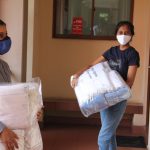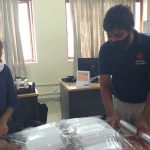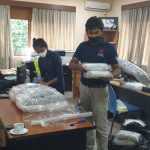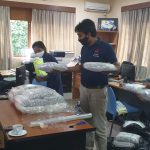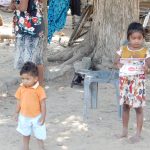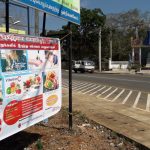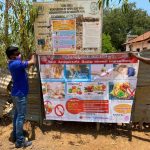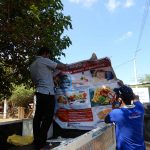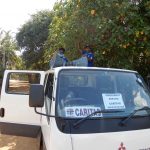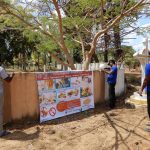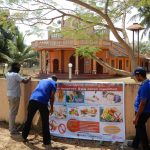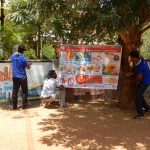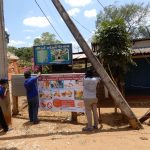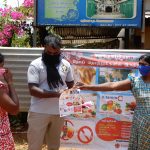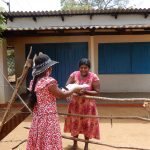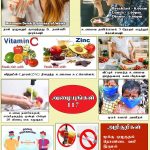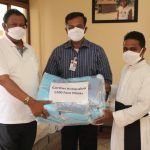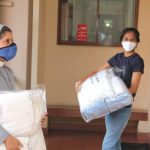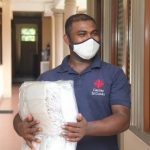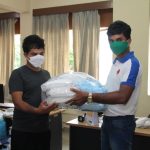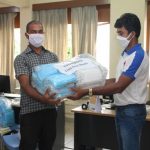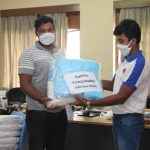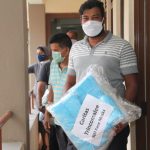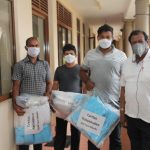The present crisis situation in Sri Lanka due to the COVID 19 outbreak has led to severe socio economic repercussions. While the Government of Sri Lanka is gradually lifting the tight restrictions imposed for nearly 8 weeks in order to revive the economy, there is still no certainty as to when this disease outbreak will be brought under control. The 3 districts in the Western Province which includes Colombo, Gampaha and Kalutara, where the impact of this crisis was most severe, has the largest population concentration in the country and small and medium scale industries which employ more than 50% of the total labour force of the country are in these 3 districts. In the country as a whole, day to day wage labour, small scale farmers and fisher folk and those in service trades such as free lance carpenters, masons, electricians and traders have been hardest hit and have very little liquid cash for expenses.
Due to the restriction of inter district transport, it has been difficult to transport farm produce to the markets and prices at the farm gate have crashed while prices in urban areas remain high. This has been a major blow to the farmers. It must be noted that agriculture contributes about 8 percent to the GDP of the economy but the labour force employed in this sector is about 28 percent. The present crisis has seriously affected farm incomes. This has disrupted livelihoods, supply chains and cash flow of the poorest families; daily wage earners are hardest hit and already feeling the economic, social, financial and cultural impacts on them. This also demonstrates the growing vulnerability of the poor women (widows, women-headed families) and children.
In Sri Lanka, those aged 60 years and above make up about 16 percent of the population. The information and data emerging on the COVID-19 outbreak suggests that older people and those with underlying health conditions will be disproportionately affected by the pandemic. People aged 60 and over appear to be more likely to suffer serious illness associated with the virus, and to experience higher mortality rates. Older people’s higher level of risk in association with COVID-19 will be compounded by their poor access to health services and support. Poor physical access to clinics and hospitals, including because of increasing levels of disability in older age, the prohibitive cost of services and a lack of awareness of health conditions are all barriers faced by older people. They constantly get ignored.
Media reports indicate a rise in domestic violence and child abuse reporting since the beginning of the lockdown. This has been aggravated by the continued closure of schools. Chief Nurse of the National Hospital Ms. P. RamyaniSoyza has raised concern over rising domestic violence with women being attacked by husbands during curfew. The Executive Director of Women in Need (WIN) say hat between 16th March and 1st April 2020, WIN received about 20 calls and 60 percent of these related to domestic violence; the Chairman of the National Child Protection Authority (NCPA) says that between 16th March – 9th April 2020, 127 of 307 complaints related to child cruelty. The challenge of living in restricted spaces and other stresses is leading to increased risk of parents and adults subjecting children to violence (Daily Mirror 17/4/20)
The Government of Sri Lanka has created two structures to deal with the present crisis. They are the 1) National Operations Centre to Combat COVID 19 and 2) Presidential Task Force for Economic Revival and Poverty Eradication. It has undertaken measures to revive the economy and roll out health, security & food distribution, however, this is more towards checking the disease in general, but the focus on vulnerable groups is not sufficient to reduce the risk to them.
Caritas Sri Lanka’s intervention in coordination with Dioceses
From the early stages of this crisis, CSL has been in touch with the Dioceses, obtaining situation updates and sending consolidated situation reports to Caritas Internationalis and other Caritas Members via baobab periodically.
Caritas Internationalis has been coordinating with the Dicastery for promoting Integral Human Development of Vatican and sharing information about the COVID 19 global pandemic.
While helping the Dioceses with immediate funds to support the affected families, CSL developed several project proposals to CI, other Caritas MOs and non- Caritas partners to obtain support to help affected families. We have received some good responses from these sources. The details are given below;
Pledged funds for COVID 19 response
| Source |
| · Caritas Internationalis/Dicastery for IHD-Rome |
| · CAFOD – UK |
| · Misereor –Germany |
| · Caritas Norway (to support agricultural activities) |
| · Catholic Relief Services (CRS) USA |
| · Caritas Hong Kong |
| · Caritas Korea |
We have included the following activities to be executed in all the dioceses.
- Supply of Dry Food for the poor families during the lockdown/curfew areas.
- Provide Hygiene Items
- Personal Protective Equipment’s/items (PPE), specially for women, children and elders.
- Special Medical Assistance for special cases.
- Handbills, Banners and Posters to the displayed in Public Places to build awareness.
While our Partners have been generous in pledging funds in response to this crisis, all of them have expressed their concern about building mitigation and preparedness activities to ensure a more sustainable recovery from this crisis.


